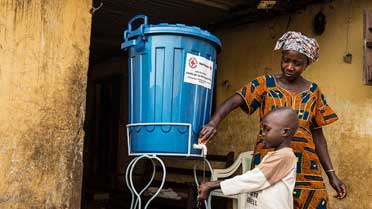The Ebola Response Anthropology Platform (ERAP) and the related Ebola: lessons for development initiatives have won the prestigious Economic and Social Research Council (ESRC) Outstanding International Impact Prize. The team comprised leading anthropologists from the Institute of Development Studies and its partners, led by IDS director and former STEPS director Melissa Leach.
The initiative built on an extensive history of research, including contributions from ESRC-funded STEPS Centre work on how social and natural scientists could work together to prepare and respond to zoonoses and infectious diseases in developing countries.
Read a case study on the ESRC website.
Putting a human lens on the Ebola crisis
In a field dominated by medics and virologists and other natural scientists, the initiative showed how valuable a social science perspective can be. Researchers saw early on that the Ebola crisis was more than a medical emergency. The epidemic was also a lens through which much that had gone wrong with development to date could be seen.

Ebola: Lessons for Development was launched at a high-level meeting of key policymakers, NGOs and researchers involved in the Ebola crisis. In a set of nine briefing papers launching the initiative, researchers from the Institute of Development Studies argue that there is an urgent need to look beyond the immediate, on-the-ground concerns of disease control and containment to consider the bigger and broader questions about international development.
ERAP was a unique and timely initiative that delivered rapid, real-time advice to policy and practice around the unprecedented social and cultural challenges that the unfolding Ebola crisis posed. The ERAP team led by Melissa Leach, included Annie Wilkinson (IDS), James Fairhead (University of Sussex), Ann Kelly (University of Exeter), Paul Richards (Njala University), Melissa Parker (London School of Hygiene & Tropical Medicine) and Fred Martineau (London School of Hygiene & Tropical Medicine).
What was the impact of the Ebola initiatives?
The Platform provided timely advice to high-level fora on case identification and diagnostics, funeral practices, home care, clinical trials, communications, community engagement and ‘resistance’. This gave shape to UK and international strategy and on-the-ground action in West Africa. As a social science Sub Committee of SAGE, they advised the government Chief Medical Officer and Chief Scientist.
The Platform website became a focal point for live information and dialogue, accessed by over 16,000 users and energising global anthropological networks. They advised three UK parliamentary inquiries which reported in January 2016 that: ‘The importance of sociological and anthropological support in the epidemic cannot be underestimated.’
Cumulatively, the Ebola initiatives influenced and engaged high-level actors including UN Mission for Ebola Emergency Response, Ministry of Defence and Department for International Development (DfID). Alongside this, media outlets from the BBC World Service’s Science in Action to the Huffington Post’s Healthy Living blog took note and either carried pieces by researchers or sought to interview them.
About the ESRC Celebrating Impact Prize
The annual ESRC Celebrating Impact Prize is an opportunity to recognise and reward researchers whose work has made a real difference to society or the economy. The prize is awarded to ESRC-funded social science researchers who have achieved impact through outstanding research, collaborative partnerships, and engagement or knowledge exchange activities.
Last year, STEPS director Ian Scoones was a winner of the Outstanding International Impact award for his work on Zimbabwe.
STEPS work on Ebola
Our research on Ebola is part of a long-running theme on zoonotic disease, focusing on the interactions between animals and humans that enable diseases to spread – and how to prepare and respond to these diseases.
Browse our resources on zoonoses
Blog posts on Ebola
Ebola in Guinea: people, patterns, and puzzles by Melissa Leach, April 2014
Ebola: failures, flashpoints and focus by Annie Wilkinson, July 2014
Ebola: identifying the true game-changers by Annie Wilkinson, September 2015
First Ebola, now Zika: inconvenient truths about emerging diseases by Kevin Bardosh, April 2016